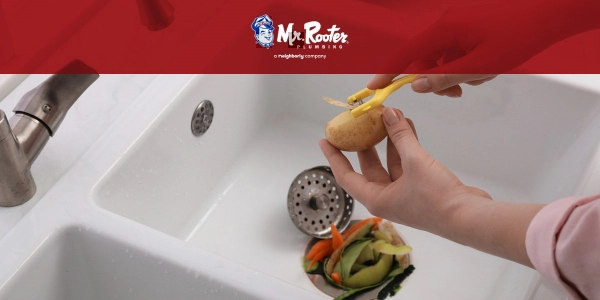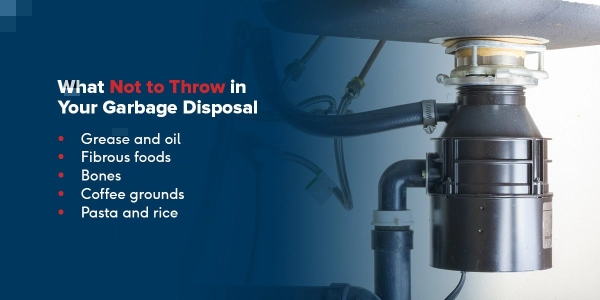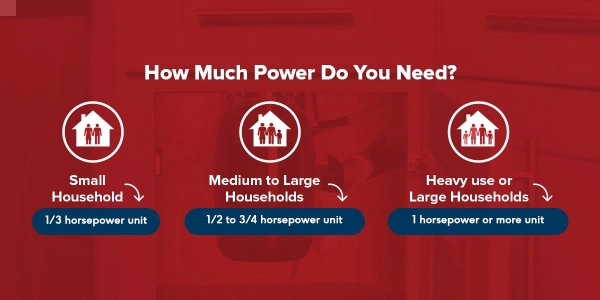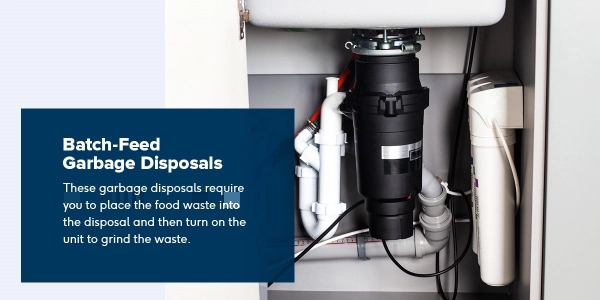
Since 1927, garbage disposals have been staple fixtures in American households. If you are considering getting one of these handy items, read on to learn about the pros and cons of installing a garbage disposal in your kitchen in our guide to garbage disposals.
What Does a Garbage Disposal Do?
Garbage disposals allow homeowners to dispose of small amounts of food waste in their sinks. The garbage disposal's blades grind the food, while the running faucet flushes the ground particles down the drain pipe.
The Pros of a Garbage Disposal
There are several benefits of installing a garbage disposal, including:
- Easy cleanup: You can dispose of small amounts of food waste with this device, making kitchen cleanup more convenient and efficient.
- Compatible with all sewage systems: You can install garbage disposals regardless of your home's sewage waste system type.
- Prevents blockages: These tools prevent food debris from causing pesky blockages that temporarily prevent you from using your sink.
The Cons of a Garbage Disposal
Some reasons not to have a garbage disposal in your sink include:
- Routine cleanings: These devices require frequent cleanings to preserve their efficiency and sanitation. Before cleaning, turn off the power. Use lemon wedges or vinegar to disinfect the disposal's components. Never use drain cleaner or bleach on your garbage disposal.
- Strange odors: If food becomes trapped in your garbage disposal's drain lines, strange smells may develop. Be sure to run the faucet as you dispose of food to flush the materials effectively.
- Food waste limitations: Despite their convenience, these disposals cannot accept certain food types, including fatty, starchy, fibrous, or hard foods.

What Not to Throw in Your Garbage Disposal
First, it is important to remember that your garbage disposal is not a trash can. While getting rid of food scraps may seem convenient, certain things should never be put down there.
- Grease and oil: Pouring grease and oil down your drain is a recipe for disaster. These substances can solidify and clog your pipes, leading to costly repairs. Instead, pour them into a container and dispose of them in the trash.
- Fibrous foods: Fibrous foods like celery, corn husks, and onion skins should never be put down your garbage disposal.
- Bones: While throwing chicken bones down the garbage disposal may be tempting, it is best to avoid this. Your disposal is not strong enough to grind bones, and they can damage the system or cause a blockage.
- Coffee grounds: They may seem harmless, but coffee grounds can accumulate in the drain and cause a blockage. They can also create a sludgy substance when mixed with water, which can coat the components of your garbage disposal and reduce its effectiveness over time.
- Pasta and rice: These starchy foods can expand and cause a blockage in your pipes.
How to Clean a Garbage Disposal
Your garbage disposal can make quick work of most food scraps if kept clean and well-maintained. There are a number of ways you can clean your garbage disposal:
- Always turn off the power: Before cleaning your garbage disposal, turn off the power to the unit to prevent accidents or injuries.
- Use ice cubes and citrus peels: One effective way to clean your garbage disposal is to grind up a handful of ice cubes and some citrus peels. The ice cubes will help to scrape away any built-up debris, while the citrus peels will help to freshen up your unit.
- Use a garbage disposal cleaner: If you prefer a commercial cleaning product, several cleaners are specifically designed for use in garbage disposals. Follow the instructions on the packaging to effectively clean your unit.
How to Choose the Best Garbage Disposal Unit
Choosing the best garbage disposal unit for your needs can be daunting, but with a little knowledge, you can make an informed decision.
Garbage Disposal Considerations
If you are in the market for a new garbage disposal, there are several things to consider before purchasing. Here is a quick guide to the different features of garbage disposal:
- Horsepower: Garbage disposals typically range in power, with higher horsepower units able to handle tougher food scraps.
- Noise level: Look for models with noise-reducing technology or insulation to help reduce the sound.
- Size: Choose a model that fits your kitchen sink and cabinet space. Measure the area under your sink before purchasing to ensure you choose a model that fits.
- Durability: A garbage disposal is an investment, so select a durable, long-lasting model. Look for models made from high-quality materials and a quality warranty to protect your investment.
- Installation: Consider hiring a professional to install your unit for you, so you can do it right the first time without any issues.
- Power cord included: Some garbage disposals come with a power cord, while others require you to purchase one separately. Check whether a power cord is included before making your purchase.
- Septic system enzymatic reservoir: If you have a septic system, consider choosing a garbage disposal with an enzymatic reservoir. This reservoir can help break down food scraps and reduce the strain on your septic system.
- Stainless steel components: Look for a unit with stainless steel components, which are more durable and corrosion-resistant.
- Anti-jamming features: Choose a unit with anti-jamming features, such as an automatic reversing function or a jam sensor.
- Multiple grind stages: Units with multiple grind stages can break down food waste more efficiently and reduce the risk of clogs.
- Easy cleaning: Units with detachable components are easier to clean and maintain.

How Much Power Do You Need?
Garbage disposals come in different sizes and power levels. The amount of power you need depends on your household's needs and the types of food waste you generate.
- Small household: Using a 1/3 horsepower unit is usually sufficient. These units are more affordable and take up less space under the sink.
- Medium to large households: A 1/2 to 3/4 horsepower unit is recommended for moderate use. These units can handle more food waste and are less likely to jam.
- Heavy use or large households: A 1 horsepower or more unit is the best option. These units can handle tough food waste and are less likely to clog or jam.
Continuous-Feed and Batch-Feed Garbage Disposals
There are two main types of garbage disposals. Understanding the differences between them can help you in choosing the right garbage disposal for your needs.
Continuous-Feed Garbage Disposals
Continuous-feed garbage disposals are designed for grinding food waste continuously while the unit is turned on. You turn on the unit, run water, and feed the food scraps into the disposal until they're all ground up.
One of the benefits of continuous-feed garbage disposal is that it can handle large amounts of food waste quickly and easily. However, one of the drawbacks of continuous-feed garbage disposals is they can be more prone to clogs and jams. This is because the unit is always running, and food waste can become stuck in the disposal.

Batch-Feed Garbage Disposals
These garbage disposals require you to place the food waste into the disposal and then turn on the unit to grind the waste. These units are typically operated by a stopper or cover that activates the unit when inserted.
One of the benefits of batch-feed garbage disposal is that it is less likely to jam or clog. The unit is not running continuously, and you can control the amount of food waste being ground up. Batch-feed garbage disposal also is safer than continuous-feed disposal.
However, batch-feed garbage disposals are slower and less efficient than continuous-feed disposals. It may take longer to grind up food waste, and you may need to run the unit multiple times to dispose of all your waste.
Do You Need a Garbage Disposal?
If you enjoy cooking or spend a lot of time in the kitchen, installing a garbage disposal is an easy, cost-effective way to streamline cleanup. Many homeowners enjoy skipping trips to the trash can and instead disposing of food waste or leftovers at their kitchen sinks before rinsing the dishes.
What Do Plumbers Think of Garbage Disposals?
In general, plumbers recommend installing these devices. These professionals will be happy to help install a garbage disposal for those who find kitchen cleanup cumbersome, habitually dispose of food waste down the sink, or frequently call the plumber about sink blockages.

Contact Mr. Rooter Plumbing of Greater Syracuse Today
With the help of our team of licensed and experienced plumbers, you can trust that your garbage disposal will be installed correctly and functioning properly. Plus, with regular maintenance, we can help extend the life span of your unit and prevent clogs and jams. We also offer 24/7 emergency plumbing services.
If you would like to install or replace a garbage disposal, contact Mr. Rooter Plumbing today. Call us today to learn more about our residential garbage disposal services near Syracuse or request your free quote for service today!

